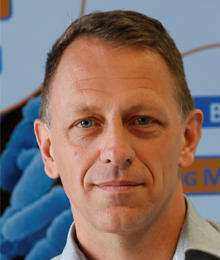An interview with Professor Julian Marchesi
December 2019
Julian Marchesi, Professor of Human Microbiome Research at Cardiff University, Professor of Digestive Health at Imperial College London and a member of the Microbiology Society, tells us more about his current research on a wide range of non-communicable diseases and ecosystems and why he thinks the human microbiome matters to microbiology.

Tell us more about your current research.
We are now studying the role of bacteria in a wide range of non-communicable diseases and ecosystems, for example, cancer and oncology, preterm birth, inflammatory bowel disease, infectious disease such as Clostridioides difficile and antibiotic-resistant bacteraemia, liver diseases and drug metabolism.
Where did your interest in microbiology come from?
As an environmental microbiologist, I was always interested in the role of microbes in ecosystem function and how they supported and underpinned these functions.
How did your research interests lead you to focus on the human microbiome?
When I embarked on my own academic career, I decided to take my skill set and move into the human ecosystem, and tried to ask the same fundamental questions: who’s there and what do they do? However, the important difference was that I was not trying to focus on single pathogenic bacteria and understanding pathogenesis in a classical microbiology fashion. Instead, I wanted to understand the role of bacterial communities and how they worked together to create emergent properties that were important for human biology and underpinned homeostasis in the gut and other ecosystems.
This goal presented some significant challenges, which were solved by adopting culture-independent methods, such as metataxonomics, metagenomics, and metabonomics. By adopting a multi-omic approach we started to understand how the bacteria were communicating with the host via a multitude of metabolites and proteins.
Why does the human microbiome matter?
I believe that to understand human biology you must now include the human microbiome in the final reckoning, and if, going forward, the human microbiome is ignored, there will never be a complete picture of what it is to be human, and we will always have a blind spot in our understanding and knowledge.


